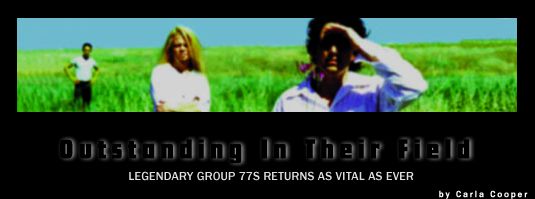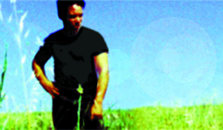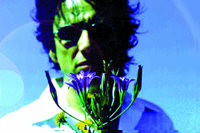
Throughout music history, there are usually a few artists or groups whose work serves as inspiration to other developing artists. 77s are such a band of modern Christian music; their pursuit of artistic excellence and lyrical honesty is often cited as an influence by countless artists, including dc talk and Sixpence None The Richer, among others. 77s continue that influence with their latest project, A Golden Field of Radioactive Crows.
 Over
the past couple of decades, the legendary modern rock band has had quite
a ride. There was the secular record deal—their 1987 Island Records
release The 77's drew huge praise from mainstream media (including
a warm review in Rolling Stone) until, just a few weeks later,
Island released U2's The Joshua Tree, and suddenly nobody at the
label was paying any attention to the little band from Sacramento. There
have been the multiple 77s lineups—the only constant all these years
has been Mike Roe. There was Sticks and Stones—a hodgepodge
of unreleased songs and demos, which turned out to be one of the band's
biggest successes.
Over
the past couple of decades, the legendary modern rock band has had quite
a ride. There was the secular record deal—their 1987 Island Records
release The 77's drew huge praise from mainstream media (including
a warm review in Rolling Stone) until, just a few weeks later,
Island released U2's The Joshua Tree, and suddenly nobody at the
label was paying any attention to the little band from Sacramento. There
have been the multiple 77s lineups—the only constant all these years
has been Mike Roe. There was Sticks and Stones—a hodgepodge
of unreleased songs and demos, which turned out to be one of the band's
biggest successes.
The last solid lineup—vocalist and guitarist Roe, bassist Mark Harmon and drummer Bruce Spencer—was last seen with the critical favorite Tom Tom Blues in 1995, followed by a tour in 1996. Then the trio effectively dropped out of sight.
Roe did a couple of solo tours (he released several solo projects in the '90s, as well as became involved with some friends in the side project The Lost Dogs,) but 77s only had sporadic appearances. "I think I was burned out," explains Roe. "'96 was a long year because we'd just done Tom Tom, then I did [solo record] The Boat Ashore, and I did the Lost Dogs' Green Room Serenade, and there was so much work going on that I became weary."
He was also finding his solo work much more gratifying than he expected. Although the solo live act was difficult at first, "I got comfortable with being in that setting and grew to like it very much," Roe says. "Much more so than playing with the band. My involvement with the band became more problematic as the years wore on. It was almost like trying on a suit that you fit in when you were really young and you put it on and it's really tight now and uncomfortable, like How did I ever wear this?"
 The
group managed to put out an EP (titled EP) in 1999, although it
was a painful experience, partly due to Roe's inability to get really
excited about the band's future. "It got to a point where I wasn't
sure whether I wanted to carry on with it or not," he says. "I
just thought, Maybe it's time to wind this thing down. I didn't
really know. After we did the basic tracks of EP, I was fairly
excited about how good they sounded."
The
group managed to put out an EP (titled EP) in 1999, although it
was a painful experience, partly due to Roe's inability to get really
excited about the band's future. "It got to a point where I wasn't
sure whether I wanted to carry on with it or not," he says. "I
just thought, Maybe it's time to wind this thing down. I didn't
really know. After we did the basic tracks of EP, I was fairly
excited about how good they sounded."
Although many consider Roe the main creative force in the band, he makes it clear that it has always been a collaborative effort. While Roe was off doing his solo touring and struggling with a major case of writer's block over the last couple of years, Harmon and Spencer began to do a lot of writing. "Mark and Bruce became prolific during that time," Roe says. "Bruce ended up writing an album's worth of material, and Mark had a half dozen [songs] too."
One thing fans of 77s can always count on is that no two projects sound alike. Throughout its history, the band has explored different musical avenues, running the spectrum of pop, rock and jazz. A Golden Field of Radioactive Crows is no exception.
"Tom Tom Blues was a fairly heavy piece, both musically and lyrically," Roe says. "This time around, the band was aiming for a different mood; the record follows kind of a jangly, pop thing, for the most part. We wanted to do something that was ... not light, but lighter than in the past."
|
"I'd
say the number one contribution is we've set free a lot of people
to like who they are and be themselves."
|
For 77s, that means rock with pop sensibilities—melodic, but with an underlying drive. "'Mean Green Season' is just a really funky, rockabilly thing, kind of like a Rolling Stones thing, that I really like a lot," Roe says. "And I'm very excited about 'Begin' because it's got that folky, elaborate production that we used for The Boat Ashore. We tried a bunch of Beach Boys harmonies at the end, very soulful. So that really is a true showpiece; it's a critical part of this project because it stands so apart from the rest of it. We're putting it at the end so that it won't be overshadowed or sound too different."
Although they don't stay away from heavy topics, they do treat them in a lighter vein. One such case is the song "Related," which talks about death. Although the song was begun before Roe's Lost Dogs bandmate Gene Eugene died, it addresses some of the feelings it brought up. "[Gene] wasn't the only friend of mine that died this year," Roe relates. "The song goes Another minute an angel comes/ gonna take away another one I love/ Is someone in a hurry to get it all done?/ Put on your wings, here's another one. It felt like, who's next? Recently, my friend Brian Healy had a heart attack, and I thought, Great, he's going to check out now. They go in threes ... maybe I'm next. You start thinking things like that.
"['Related'] kind of captured an interesting idea that we'd never sung about before," Roe continues. "We'd never sung about people dying; it was a little weird. Yet the production was kind of jocular, to offset it. I think it deals with it in a very non-morbid, positive way. Not quite flip, but an interesting way of looking at it. I really like the direction that took, lyrically. It takes a very serious subject and treats it in kind of a pop idiom."
 Trying
to distill 20 years of history down to a single message, Roe attempts
to wrap up what 77s have always been about. Aside from a commitment to
artistic excellence, "I'd say the number one contribution is we've
set free a lot of people to like who they are and be themselves,"
he says. "That's been my number one message to people—be yourself,
be the person that God made you to be. It's a really important message
that I have to tell people, because they obviously see me being who I
am. A lot of times it's irritating and annoying, but it is definitely
me," he laughs.
Trying
to distill 20 years of history down to a single message, Roe attempts
to wrap up what 77s have always been about. Aside from a commitment to
artistic excellence, "I'd say the number one contribution is we've
set free a lot of people to like who they are and be themselves,"
he says. "That's been my number one message to people—be yourself,
be the person that God made you to be. It's a really important message
that I have to tell people, because they obviously see me being who I
am. A lot of times it's irritating and annoying, but it is definitely
me," he laughs.
Roe talks about the difficulty of watching his daughter closing in on her teen years and hoping she can maintain a strong sense of herself. When he became a teenager, "I fell for everything, based on my not having a lot of self-esteem and not believing in who I was. I think I was incredibly hip and intuitive up until I went into high school," he continues seriously. "Then I started to doubt myself musically, socially, spiritually—just about in every possible way. I started to feel like everyone else and everything else was hipper, smarter, more with it, more accurate than that person I really liked growing up, that person I was cool with.
"I've spent most of my adult life having to strip away the layers of falseness that I layered onto myself, to get back to the basic Michael Roe at 12 years old." He finishes with a smile, "And I'm almost there."
©2001 7ball Magazine--all rights reserved